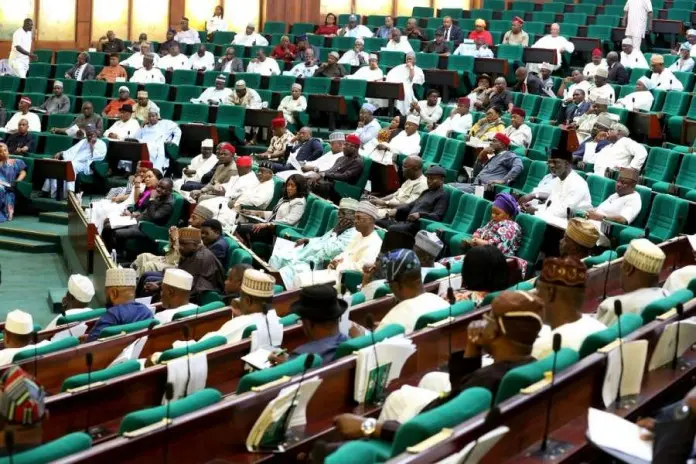President Bola Ahmed Tinubu has written the House of Representatives to seek the Repeal and Re-Enactment of the Student Loan (Access to Higher Education) Bill.
The President’s letter conveying the repeal and re-enactment of the law was read on the floor of the House at plenary on Thursday by Speaker Abbas Tajudeen.
The new Bill seeks to enhance the implementation of the Higher Education Student Loan Scheme by addressing challenges related to the management structure of the Nigerian Education Loan Fund (NELF), applicant eligibility requirements, loan purpose, funding sources and disbursement and repayment procedures.
“Pursuant to Section 58(2) of the Constitution of The Federal Republic of Nigeria, 1999 (as amended), I forward, herewith, The Student Loan (Access to Higher Education) (Repeal and Re-Enactment) Bill, 2024 for the kind consideration of the House of Representatives.
“Whilst hoping that this submission will receive the usual expeditious consideration of the House of Representatives, please accept, Rt. Honourable Speaker, the assurances of my highest consideration,” the letter read.
Tinubu had signed the Student’s Loan (Access to Higher Education) Bill, 2019 into law barely two week in office.
The legislation provides for the establishment of the Nigerian Education Fund, domiciled with the Central Bank of Nigeria (CBN) from which qualified applicants can access education loans through the commercial banks in the country.
However, stakeholders in the education, legal and financial sectors had identified some shortcomings in the Act during the summit on the law organised by the House Ad-hoc Committee in August last year.
For instance, the then President of the National Association of Nigerian Students (NANS), Comrade Usman Barambu had called for the amendment of the stringent conditions which would hamper students access to the loan.
Also, a Senior Advocate of Nigeria and the Vice Chairman of the Body of Benchers, Chief Adegboyega Awomolo, SAN had said the Act was made in a hurry with defects that need to be addressed for it to meet the desired results.
A policy brief on the proposed amendment provides for the established of the Nigeria Education Loan Fund (NELFUND) as a corporate body that can sue and be sued in its name, and has the power to acquire, hold, and dispose off movable and immovable property for the purpose of its functions.
NELFUND is to amongst others build, operate, and maintain a diversified pool of funds to provide loans to qualified applicants and ensure access to higher education, vocational training, and skills acquisition.
This is contrary to the subsisting legislation which imposes on the Governor of the Central Bank of Nigeria (CBN) management and executive responsibilities outside the core mandate of the CBN which should be the Governor’s focus.
The planned re-enacted bill removes the family income threshold so Nigerian students can apply for these loans and accept responsibility for repayment according to the Fund’s guidelines.
It also, “removes the guarantor requirement so that students can apply for and receive loans subject to application and identity verification guidelines as provided by the Fund.
“Student applicants can no longer be disqualified based on their parent’s loan history. Applicants to the Fund may apply for loans to cover tuition and other fees payable to the school and maintenance allowance payable to the student.
“Beneficiaries of the Fund shall begin as soon as the beneficiary becomes employed in any capacity-The Fund shall not initiate loan recovery efforts until two years after the completion of the National Youth Service programme.
“A beneficiary may request an extension of enforcement action by the Fund by providing a sworn affidavit indicating that he is not employed in any capacity and is not receiving any income.
“Only a person who provides a false statement to the Fund under this section is guilty of a felony and is liable to imprisonment for three years. Makes provision for loan forgiveness in the event of death or acts of God causing inability to repay.”
The new provisions are at variant with those in the subsisting Act, including that, students can only apply for loans to pay tuition fees and not be able to apply to the Fund for loans to cover those other institutional charges or their other upkeep costs.
The current Act also allows only applicants with a combined family income of less than N500,000 per annum to apply, hence the child of a person who earns N45,000 a month is disqualified from applying for this loan.
It further requires that applicants provide two guarantors who shall be a civil servant of Level 12 and above, a lawyer with ten years post-call experience, a judicial officer, or a Justice of the Peace; disqualifies the children of parents who have defaulted on any loans previously from applying for the student loans.
The present law equally criminalises failure to repay loans obtained from the Fund without consideration for circumstances, including unemployment, death, or disability, that may affect an individual’s ability to pay while the Education Loan Fund is not a body, creating potential problems around the Fund’s ability to enter contracts, including loan agreements with applicants, or to initiate enforcement actions to recover loans from beneficiaries.











